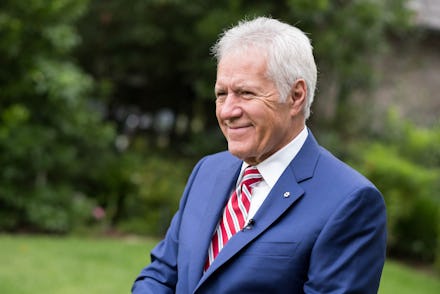Our uncomplicated love of Alex Trebek

There was so much time to brace for the inevitable, in the months since Alex Trebek was diagnosed with stage 4 pancreatic cancer back in spring of 2019, but it still didn’t seem like he would ever leave. Unflappable as ever, he just kept on hosting Jeopardy! — often in excruciating pain, during a pandemic, and with the same trademark composure. Early Sunday morning, Trebek died at 80, after a nearly two-year battle with cancer.
Trebek was born in Sudbury, Ontario, where he’d go on to work as a bellhop in the same hotel where his father worked as a chef. Before he became the consummate game show host, Trebek took up a career in broadcasting, working for Canada’s CBC and taking any range of assignments that came his way. Chalk up his steely demeanor and grab bag of knowledge to his time as a newsroom underling, but Trebek had to work his way through a number of marginal hosting gigs upon moving to the U.S. in the ‘70s.
These shows — The Wizard of Odds, Double Dare, Classic Concentration, High Rollers, and more — rarely lasted more than a few years, but he honed his skill as a wry, dependable host nevertheless. Not until seizing the syndicated version of Jeopardy! in 1984 did he really find his foothold as a cross-generational institution.
He departs as one of the last true universally beloved figures in American culture through his run on Jeopardy!, 36 years, more than 8,000 episodes, and seven Daytime Emmy Awards later. It’s not the kind of blueprint you can follow easily — occupying the consistency and down-the-middle frankness of an old guard network news host, with the playful warmth to leave a formative impression on the right viewer. In one of the final episodes to air before his death on Sunday — it should be noted, the series still has enough Trebek-hosted episodes to run until December 25 — champion Burt Thakur tearfully told Trebek that watching Jeopardy! every night with his grandfather helped him learn English.
Despite his role as this sort of paternal, instructive presence, Trebek was a delightful bundle of contradictions. He was like the kind, knowing professor, who could still be kind of a bully and stare you down over his glasses. As host of an unbelievably nerdy enterprise — a dinner-hour trivia program that hasn’t considerably updated its aesthetic since it began — Trebek still managed to playfully chide contestants for not knowing the answers to fairly basic sports questions or being into nerdcore hip-hop. He’d bring the same reverent cadence to reciting lyrics from an old opera as he would top 40 rap lyrics. Trebek was almost entirely averse to bullshit on air, except for the rare occasion when he absolutely reveled in it.
It feels like a safe assumption that no one will ever maintain this kind of presence again on network or syndicated television, with viewership splintered across platforms and ideologies. With murky enough politics so as not to alienate either side of the spectrum, liking Trebek never communicated a discernible worldview beyond enjoying a calming trivia show over dinner. His closest analogues — late-night hosts, national news anchors, and Pat Sajak — have all but alienated half of the country in one way or another, despite their best efforts. Trebek was just a host who seemed like the smartest guy in the room, or at least smart enough to corral some of the smartest people in America.
Jeopardy! will find a new host to replace Trebek — it’s too sturdy an institution to not, and he repeatedly maintained that he didn’t want to see the show’s legacy die with him. But losing Trebek marks the end of a certain type of TV guy — the kind who maintained public trust through sheer volume, dependability, and neutrality.
Although Trebek and Chadwick Boseman departed on decidedly different terms — one suffering publicly and transparently, while the other isolated close colleagues from the grim prognosis — they both treated their work as a sort of public service so much as the ideal coping mechanism. Not everyone has the resources, stamina, or emotional capacity to spend their final years in this way, but it’s the kind of selfless embrace — of believing that your work serves a greater purpose to people like Burt Thakur — that led them to keep going in the face of impossible circumstances.